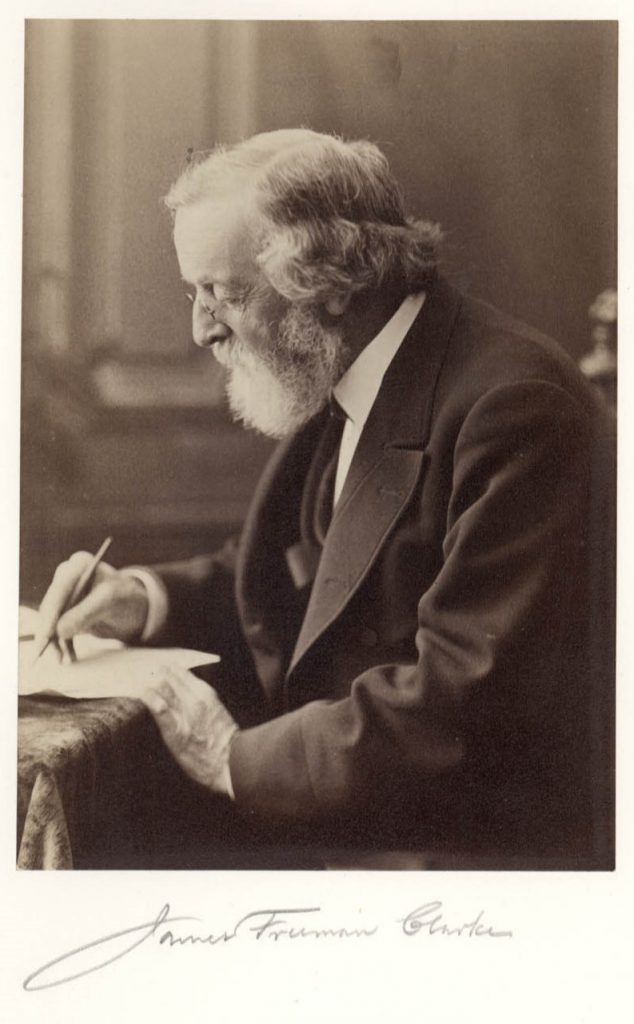by Susan Martin, Senior Processing Archivist
I’m very pleased to announce a new collection available for research, the Perry-Clarke additions. I’ve been processing this collection for a while now, and I can honestly tell you I’m a little sorry to be finished with it. It’s been one of the most interesting (and challenging) I’ve worked on here at the MHS.
The collection contains the papers of Unitarian minister, transcendentalist, author, and social reformer James Freeman Clarke, as well as many family members from multiple generations. The “Perry” in the title comes from the collection’s donor, Clarke’s great-granddaughter Alice de Vermandois (Ware) Perry.

As you can probably tell from the name, these papers consist of additions to the Perry-Clarke collection, which Alice Perry gave to the MHS back in 1979. After that collection was processed and made available to researchers, Perry donated multiple subsequent installments of family papers. These additions posed a number of problems: many of them were completely unorganized and unidentified, and some portions were even covered in active mold.
Unfortunately, because of these problems and the lack of time and staff to address them, most of the additions have been malingering in our backlog. We did arrange, catalog, and make available four boxes of some of the most significant material—all the letters James Freeman Clarke wrote to his wife between 1832 and 1888—but the rest was largely unusable.
Thankfully that’s no longer the case! While it wasn’t possible, at this late date, to incorporate the additions into the primary collection, I’ve processed the additions separately and created links between the two. At 46 boxes, this collection is smaller than the first (64 boxes), but there’s a lot of overlap.
The collection contains ten boxes of family correspondence (the previously cataloged letters from James to Anna are filed here), followed by nine boxes of James’s papers, primarily manuscript and printed copies of his sermons and other writings.
James may be the headliner, but the collection also includes papers of several equally impressive relatives. Among them are his sister Sarah Freeman Clarke, an artist, author, teacher, and philanthropist; his wife Anna (Huidekoper) Clarke and members of the influential Huidekoper family of Meadville, Pennsylvania; his incredibly high-achieving children, Lilian (reformer and translator), Eliot (engineer and mill manager), and Cora (botanist and entomologist); and his daughter-in-law Alice and her family.
In fact, while the additions complement the original donation in many ways, they have even more to offer. Alice was, through her mother, a member of the famous Lowell family of Boston, so about a third of the additions is made up of Lowell family papers that Alice brought along with her when she married Eliot Channing Clarke in 1878.
The Lowell material includes, for example, nearly 30 volumes kept by Alice’s great-aunt Rebecca Amory Lowell during her decades of work as a Sunday School teacher, as well as 21 diaries of another great-aunt, Anna Cabot Lowell, that neatly fill the gap in one of our other collections! An entire box consists almost exclusively of letters written by Alice’s great-great-aunt, another Anna Cabot Lowell, during the Federalist Era.
Processing this collection meant opening a lot of boxes of miscellaneous unidentified loose manuscripts and crumbling volumes and identifying, to the best of my ability, what they were, who wrote them, and where they belonged. I was particularly impressed by how much material I found documenting the accomplishments of women.
I hope and expect the Perry-Clarke additions will get a lot of use by researchers. I know I intend to mine it for many future blog posts. Thanks to Interim President Brenda Lawson for prioritizing the processing of this collection.

